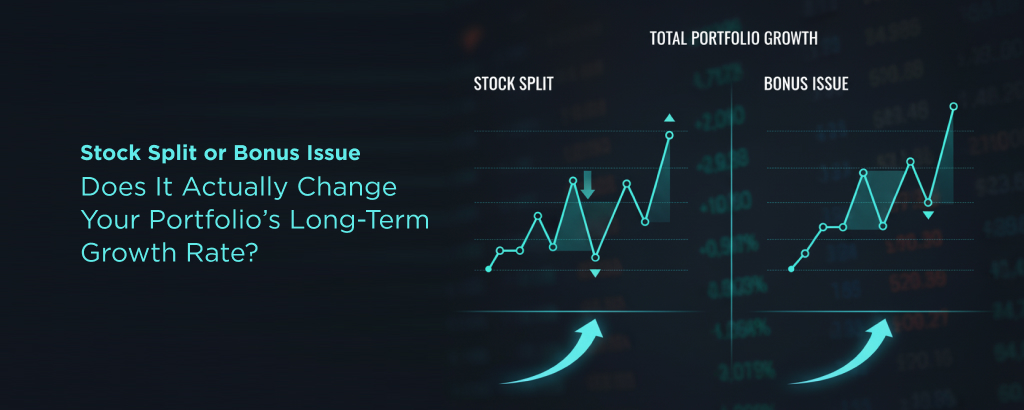When a company rewards shareholders with a stock split or a bonus issue, it feels like a windfall. You suddenly see more shares in your account! It feels like a small jackpot.
But here’s the real question: Does this make your investment grow faster? Does it improve your CAGR?
The Short Answer: No, a stock split or a bonus issue does not directly change your investment’s CAGR.
They don’t make your money grow overnight. They are financial adjustments — like breaking a ₹2,000 note into two ₹1,000 notes. You have more pieces, but not more value.
1. What is a Stock Split?
In a Stock Split, a company divides its shares into smaller units. This leads to a drop in the price per share and face value, thus shares become more affordable for retail investors.
Example: In a 2-for-1 split, if you had 1 share worth ₹2,000, after the split, you’ll have 2 shares worth ₹1,000 each.
2. What is a Bonus Issue?
A bonus issue is like a “thank you gift” from the company. The company rewards existing shareholders by giving them extra shares — for free.
Example: In a 1:1 bonus, if you had 10 shares, you’ll now have 20. The catch? The price per share adjusts downwards, so the total value remains unchanged.
4. Why does The Value Remain The Same?
The reason your CAGR is unaffected is that in both scenarios, the increase in the number of shares is perfectly offset by a proportionate decrease in the share price.
Let’s see this with an example:
| Before the Event | After 2-for-1 Split / 1:1 Bonus |
|---|---|
| 100 shares @ ₹100 = ₹10,000 | 200 shares @ ₹50 = ₹10,000 |
Your number of shares doubled, but price per share halved. The total value stays the same.
That’s why your CAGR doesn’t change on the day of the split or bonus.
5. Why Do Companies Do This?
Bonus Shares: Instead of paying out cash dividends, some companies reward shareholders by giving additional shares. This is basically a way of distributing their reserves in the form of shares rather than cash.
Stock Split: It does not involve any cash outflow or reserve adjustment; it is simply a structural change aimed at increasing liquidity and making shares more affordable.
6. But Can They Indirectly Help Returns?
Yes, sometimes. While the corporate action itself doesn’t increase your CAGR, it can create a positive environment that helps the stock perform better in the future:
Affordability & Demand – A lower share price after a split often attracts more retail investors, thereby increasing demand.
Positive Signaling – A bonus issue typically indicates that the company has strong financial reserves and confidence in its future growth.
Market Momentum – News of splits/bonuses often generates excitement, and this sentiment can drive prices up.
So while your CAGR doesn’t jump instantly, the after-effects of these actions can sometimes improve future returns.
7. The Smart Investors Takeaway
A stock split or bonus issue is a result of strong performance, not the cause of performance.
Don’t confuse “more shares” with “more wealth.” Your long-term CAGR will always depend on:
- The company’s earnings growth
- Its competitive strength
- How well it’s managed
Splits and bonuses are simply rewards along the way, not the real drivers of wealth creation.
For personalized guidance, consider consulting a Certified Financial Planner or a Financial Advisor. They can help you align your investments with your long-term goals.



